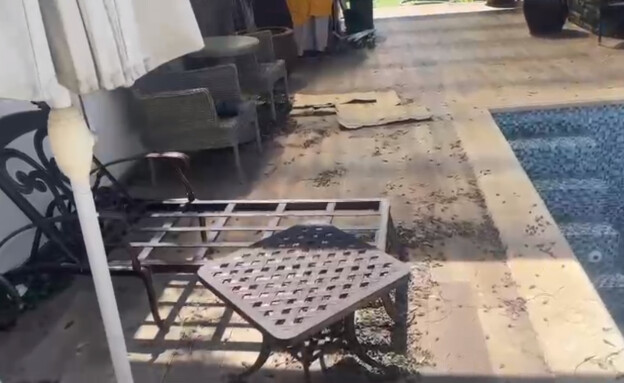My father and his family, who were evicted from the moshav, initially rented an apartment in Tiberias and a few days ago moved to the Kariyat area, after the landlord of their apartment decided to raise their rent by 3,000 shekels in Mecca. They have a hospitality suite which, as mentioned, was greatly affected by the situation. A week ago he arrived at the moshav where he lived until 7.10 and saw with his own eyes his house and source of livelihood completely destroyed.
My father Kamisa, from nearby Moshav Netua, is also in the same predicament, along with hundreds of other owners of B&Bs and villas for accommodation. My father is originally a farmer, who due to the difficulty of making a living decided about a year ago to build a guest house next to his house. The damage at my father’s place is mainly manifested in wear and tear, mice and rats, the electrical and water systems that don’t work, the pool and jacuzzi, and scale and corrosion.
“I arrived at the place a month ago to turn on the water and see that there are no leaks and cracks and the place looks terrible,” he says. “The place looks neglected. All the grass around has taken over and everything is dusty. It’s not pleasant to see your investment go down the drain.”
It is clear to my father that even after the war is over, he will not recover, people will not come and the state will not really provide adequate compensation. “No one talks to me” he says. “And I know there’s nothing to make people mad at the moment because there’s no direction at all to outline adequate compensation, they haven’t started working. Property tax only looks at direct damage, not indirect damage. That is, if you’re not directly hit by a projectile, you have nothing to do. I know that the damage is It’s much worse than what you see with your eyes, and we probably won’t be able to bring it back.”
“The human economic damage is manifested in a variety of aspects”
As mentioned, like Avi Shalab and Avi Kamisa, there are hundreds more residents of the north who are not sure that their hospitality business will ever get back on its feet. Attorney Eli Doron, founding partner and expert in tax law and property tax claims from the attorney office of Doron, Tikotsky, Kantor, Gutman, Amit Gross & Co., describes the widespread phenomenon: “Since the outbreak of the war, many business owners from the tourism sector have turned to me for assistance Immediately, some with tears in their eyes, with a feeling of frustration and helplessness due to the security situation.”
He continues: “Last Passover, a time that was supposed to be a peak period for local tourism, the zimmers remained empty. If the Israeli government wants the tourism business to survive, in the country as a whole – and in the settlements along the conflict line in particular, it is important to dedicate the time and resources to this within the framework of a national emergency plan. If the war ends tomorrow morning, it will take time for the tourism business to recover and return to normal, and even after the end of the war – a substantial period of time and a proper budget will be required to repair and return to activity all the businesses that were damaged or worn out.”
At the same time, Attorney Doron says that it is important to compliment the conduct of property tax officials who, according to him, do everything they can to help the business owners. But they are also subject to the law and government decisions and have to deal with many precedent cases for which there are no clear rulings or laws. “For example, there is no Currently, the legislation has clear instructions regarding ongoing damage when the owner of a property cannot come and maintain it, a situation many B&B owners have been dealing with in the conflict zones since the outbreak of the war.
“The human economic damage is manifested in a variety of aspects: a drought in bookings and vacation cancellations, ongoing maintenance costs, a cash flow that will drop to zero and it is unclear when it will recover, physical damage as a result of the war damage, systems that wear out as a result of lack of use, etc. I hope and appreciate that at the end of the war, the state will be able to compensate the The owners of the B&Bs for the entire period in which they were shut down, including compensation for the loss of profits and the current expenses that the business owners were required to pay (property tax, water, electricity, etc.) I also assume that compensation will be given for the recovery period after the war – but it is not clear what chapter The time for him will be compensated for the recovery.”
At the same time, Attorney Doron points out that there is real uncertainty regarding the right to compensation for neglecting the B&Bs due to the forced eviction. The B&Bs return them to their former state.”
